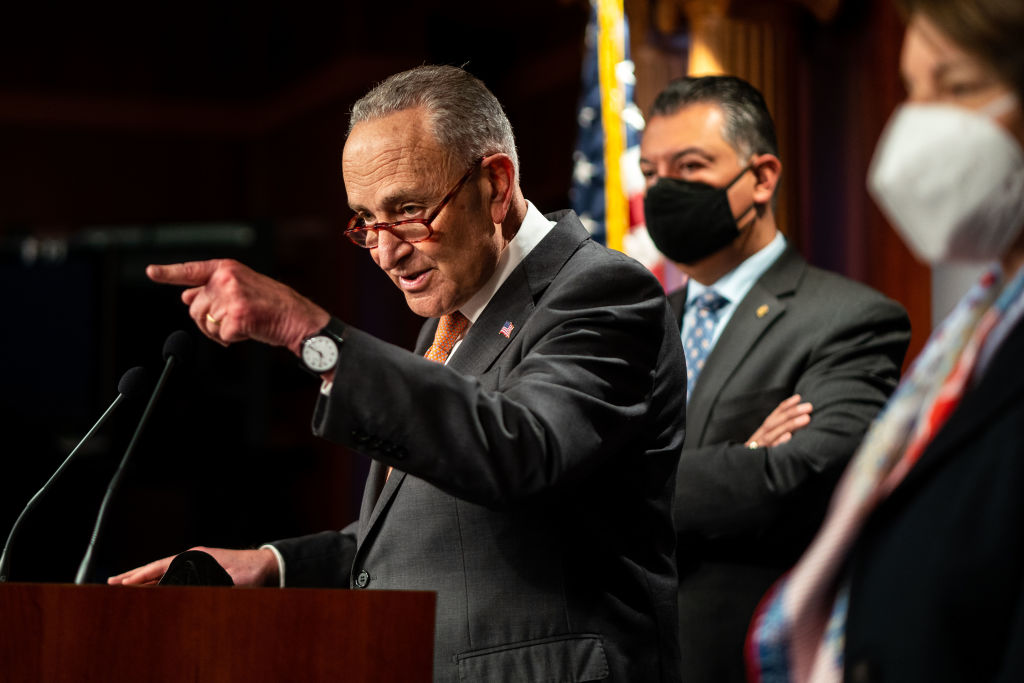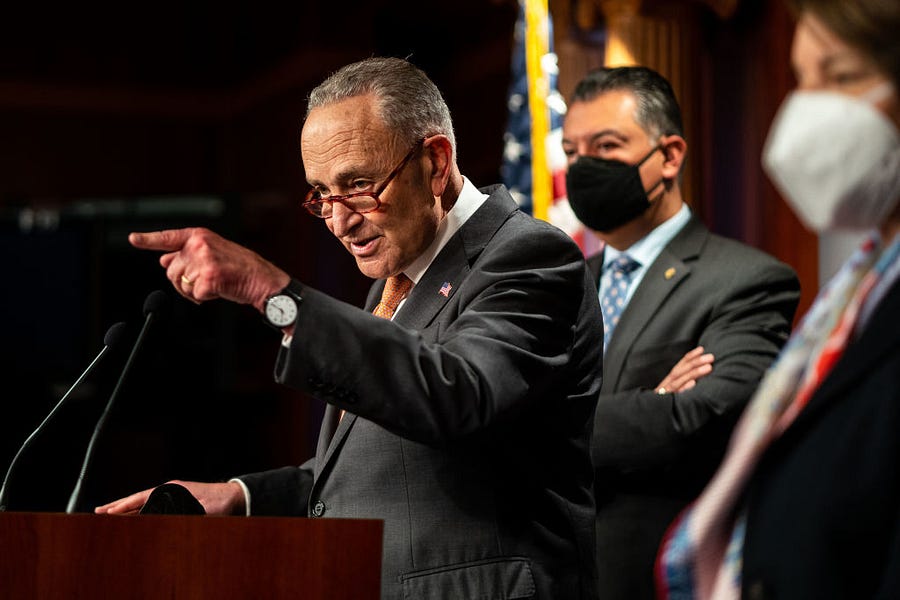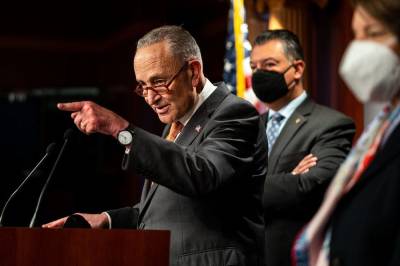Happy Wednesday! It’s always nice to see a democratic process arrive at the objectively correct answer: New YouGov data shows that, among esports fans, Super Smash Bros. remains the most popular fighting video game.
Quick Hits: Today’s Top Stories
The Centers for Disease Control said on Tuesday it believes the Omicron variant accounted for between 93 and 97 percent of all new COVID-19 infections in the United States during the week ending January 1, with the remainder being caused by the Delta variant. The U.S. is now averaging approximately 500,000 confirmed new cases per day, but the number of daily deaths attributed to COVID-19 has remained more or less steady since early November.
Pfizer announced Tuesday that the U.S. government doubled its order of Paxlovid—the company’s recently authorized COVID-19 antiviral pill—to 20 million treatment courses, the first 10 million of which will be delivered by the end of June.
The U.S. labor market remains incredibly tight, as the Bureau of Labor Statistics reported Tuesday a record 3 percent of workers quit in November—many of them for better or more high-paying opportunities elsewhere—and the number of job openings remained near all-time highs at 10.6 million.
Albany County District Attorney David Soares announced Tuesday that former New York Gov. Andrew Cuomo will not be prosecuted for allegedly groping a former aide in 2020, saying that, although his office found the complainant in the case credible, “we have concluded that we cannot meet our burden at trial.” Cuomo’s onetime lawyer said Monday the Manhattan district attorney had decided not to bring charges against the former governor for his role in obfuscating the number of New York COVID-19 deaths tied to nursing homes, as well.
Chicago Teachers Union delegates voted 555-77 on Tuesday in favor of moving to remote learning on Wednesday, a move Chicago Public Schools (CPS) has described as an illegal strike. Pedro Martinez, CEO of CPS, said yesterday he plans to cancel classes today but keep schools open for students, teachers, and staff that want to come in. “If you want to be compensated, you have to show up for work,” he said. “It’s really that simple.”
Japan’s coast guard reported that North Korea launched a suspected ballistic missile off its east coast early Wednesday morning, its first since leader Kim Jong-un pledged to “powerfully propel” the country’s weapons systems forward.
Rep. Brenda Lawrence of Michigan announced last night she will not seek reelection in 2022, becoming the 25th House Democrat to do so this cycle.
With Build Back Better On Ice, Senate Democrats Move to Voting Reform

With Build Back Better on the shelf for now, Senate Democrats are moving on. In a letter to his colleagues earlier this week, Majority Leader Chuck Schumer announced the Senate will shift its focus from President Biden’s multi-trillion dollar climate and social spending package to voting reform, another legislative priority that’s likely to stall.
“Over the coming weeks, the Senate will once again consider how to perfect this union and confront the historic challenges facing our democracy,” he wrote, referencing the one-year anniversary of January 6. “We hope our Republican colleagues change course and work with us. But if they do not, the Senate will debate and consider changes to Senate rules on or before January 17, Martin Luther King Jr. Day, to protect the foundation of our democracy: free and fair elections.”
In practical terms, that means we’re about to enter yet another cycle of pundits and reporters wondering if this is the time Democratic Sens. Joe Manchin and Kyrsten Sinema finally agree to abolish the legislative filibuster. The answer—like it was in March, and in June, and in October, and in December—is almost assuredly still no.
Unlike the Build Back Better Act, Manchin and Sinema—after a few tweaks were made—actually support the bills Democrats will try to pass in the coming weeks. “Ensuring our elections are fair, accessible and secure is essential to restoring the American people’s faith in our Democracy,” Manchin said in November of the John Lewis Voting Rights Advancement Act. But with Republicans almost uniformly opposed to the bill, the only way it’s passing this month is if all 50 Democrats agree to do away with the filibuster.
“As former Senator Robert Byrd famously said, Senate Rules ‘must be changed to reflect changed circumstances,’” Schumer wrote in his letter. It wasn’t particularly subtle, quoting Manchin’s predecessor in West Virginia in whose footsteps Manchin has said he’s tried to follow. It also didn’t seem to work.
“Being open to a rules change that would create a nuclear option, it’s very, very difficult. It’s a heavy lift,” Manchin said Tuesday, telling reporters that his “preference” is for any changes to Senate procedure (he favors a couple minor ones that would make it easier to open debate on legislation) to be done in a bipartisan manner. “For us to go it alone, no matter what side does it, it ends up coming back at you pretty hard.”
In 2018, with the Senate days away from confirming Brett Kavanaugh to the Supreme Court with just 50 votes, Sen. Amy Klobuchar of Minnesota expressed regret that Democrats opted to do away with the filibuster for judicial nominees back in 2013. “I don’t think we should’ve made that change, when we look back at it,” she said. “But it happened because we were so frustrated, because President Obama wasn’t able to get his nominees.”
Earlier this year, Klobuchar was one of the first in her party to endorse eliminating the legislative filibuster to pass electoral reform.
There’s plenty a future GOP Senate majority could do with a 50-vote threshold that it couldn’t with a 60-vote one—nationwide constitutional carry or fetal heartbeat bills, for example, or simply clawing back whatever voting reforms that Democrats pass—but some progressive activists say they’re willing to take their chances.
“It has become clear even to those who were skeptical before that the filibuster is a weapon that Senator McConnell uses to block even debate on bills that he doesn't like,” Eli Zupnick, a spokesman for the progressive organization Fix Our Senate, told The Dispatch. “Without a filibuster, there will be more accountability, and politicians will no longer be able to blame the filibuster for not being able to deliver on their promises.”
While running for president, Biden—himself a longtime senator—told reporters that ending the filibuster would be a “very dangerous move,” precisely because it can also be used to block Republican priorities. But his views have softened since taking office. In March, he expressed support for the return of the talking filibuster, which would require lawmakers to speak continuously on the Senate floor to gum up the works. In an ABC News interview last month, he went even further. “If the only thing standing between getting voting rights legislation passed and not getting passed is the filibuster, I support making the exception of voting rights for the filibuster.”
Manchin doesn’t: “Anytime there’s a carve out, you eat the whole turkey,” he said yesterday. But Biden’s changing tune is hardly a surprise. “Where you stand depends on where you sit,” said Philip Wallach, a senior fellow at the American Enterprise Institute who focuses on the relationship between Congress and the administrative state. “Life looks different as a chief executive sitting in the White House, frustrated by your inability to get some of your key agenda items through the Senate.”
To some congressional observers, the pivot toward voting reform—which even Schumer conceded Tuesday is an “uphill fight”—is little more than an effort to distract disappointed voters from that inability to muscle Build Back Better through the Senate. But it could also provide Democrats political cover while a potential BBB resuscitation effort carries on in the background.
“Getting anywhere with Manchin on a version 2.0 reconciliation package is going to take weeks at the earliest,” Liam Donovan, a lobbyist and former Republican Senate campaign operative, told The Dispatch. “They need to do something in the meantime, and the decision seems to be to tie the anniversary of 1/6 to voting rights and the MLK holiday, and using these as a moral grounds to seek a rule change.”
If Democrats are truly concerned about a repeat of January 6, more and more Republicans are coming around to the idea of reforming the Electoral Count Act. The poorly written, 135-year-old law that attempts to outline Congress’ role in counting electoral votes is rife with loopholes and served as the basis for the plan hatched by those close to former President Trump attempting to overturn the election results.
“I’d support anything that provides a little more clarity and certainty and transparency,” GOP Sen. John Cornyn told TMD last month. “For a long time now, we’ve been able to do this without much controversy. But now that we’ve seen the confusion that can be caused, maybe that’s something we should look at.”
On Tuesday, Sen. John Thune—the second-highest ranking Republican in the Senate—threw his weight behind ECA reform as well. “What the Democrats are trying to do [with voting rights] is have a government take over state regulation [and] administration of elections, which is not something we’re for,” he told Axios. “But with the Electoral Count Act, as we saw last time around, there are some things there that, I think, could be corrected.”
Democrats are generally on board with updating the antiquated law, too, but early indications are that Schumer—worried doing so would dampen what little momentum is left for his party’s broader plans—does not view a bird in hand as better than two in the bush.
“That makes no sense,” he said yesterday when asked about passing ECA reform on a bipartisan basis rather than nuking the filibuster for the John Lewis Voting Rights Advancement Act and Freedom to Vote Act. “If you’re going to rig the game and say, ‘Oh, we’ll count the rigged game accurately,’ what good is that?”
Is Corporate Greed Actually to Blame for Rising Prices?
America is facing an inflation problem. In a Wall Street Journal poll conducted in mid-November, 56 percent of respondents said rising costs were causing them major or minor financial strain—with another 32 percent saying they will soon—and, rightly or wrongly, a plurality believed Biden administration policies to be the main driver of the phenomenon. Four in five respondents to a December CNN survey described inflation as a “major problem,” and just over 7 in 10 said the U.S. government was doing “too little” to get it under control.
To oversimplify a bit, inflation runs rampant when the amount of money in circulation grows at a faster pace than economic output. With Congress and the Federal Reserve pumping trillions into the economy to keep it afloat over the past few years and supply chains taking time to kick back into gear post-lockdown, there’s very little the Biden administration could have done—save maybe go back in time and not sign the American Rescue Plan into law—to stave off the bulk of the price increases we’re seeing today.
But politically, that’s not workable. It makes sense, then, that Biden administration officials began ditching the “it’s transitory” rejoinder and started rolling out a series of more proactive messages in an effort to convince Americans they have a grasp on the situation.
First, Biden pivoted to begin pitching his multi-trillion dollar Build Back Better agenda as actually being disinflationary, despite even some Democratic economists conceding it would heighten inflationary pressures in the short-term. The White House announced in mid-October that the ports of Los Angeles and Long Beach would move to 24/7 operations to ease supply-chain constraints, and a few weeks later, Biden boasted the decision was “already paying off.” On November 23, the administration declared it would release 50 million barrels of oil from the Strategic Petroleum Reserve to “lower prices for Americans,” and soon after, the president took credit for a 7-cent-per-gallon drop nationwide.
More recently, several prominent Democrats have zeroed in on another shiny “make things cost less” button to smash: cracking down on market concentration and corporate profits.
In late November, Sen. Sherrod Brown argued that prices are high simply because “corporations are raising them so they can keep paying themselves with ever-larger executive bonuses and stock buybacks.” Around the same time, Sen. Elizabeth Warren made a similar accusation. “Corporations are exploiting the pandemic to gouge consumers with higher prices on everyday essentials, from milk to gasoline,” she said. “American families shouldn’t be bankrolling corporate America’s record-high profits.”
“I would say there’s some areas where we have seen corporations benefit, profit from the pandemic,” White House Press Secretary Jen Psaki told reporters last month.
Scott Lincicome, Cato Institute economist and author of The Dispatch’s Capitolism newsletter, described the argument as “98 percent political” in an interview yesterday. “At the broadest level, it’s pretty nonsensical,” he said. “Companies can charge higher prices—and they can make higher profits—only on the basis of willing consumers, and when willing consumers have the money to spend.”
If boosting corporate profits was as simple as jacking up prices, businesses and retailers would’ve done it years ago—but annual inflation averaged just 2.02 percent from 2002 through 2020. What changed? Thanks, in large part, to generous pandemic aid and the expanded child tax credit, Americans have saved up record amounts of money over the past two years—and they’re ready to spend it.
“Pre-pandemic, one of the big things that was keeping inflation in check was consumers’ unwillingness to pay higher prices,” Lincicome said. “[Now, businesses] have cost pressures and demand is through the roof, and thus [they’re] able to pass on higher costs to consumers. Consumers are willing to take it.”
Thus far, progressive lawmakers’ accusations of corporate profiteering have spanned multiple industries: Oil and gas, grocery stores, semiconductors, car rentals, any company that spent money on stock buybacks. But this week, the White House has focused on one: meat.
“Four large meat-packing companies control 85 percent of the beef market. In poultry, the top four processing firms control 54 percent of the market. And in pork, the top four processing firms control about 70 percent of the market,” the White House said earlier this week while announcing a series of initiatives aimed at boosting independent farmers, ranchers, and processors. “When dominant middlemen control so much of the supply chain, they can increase their own profits at the expense of both farmers—who make less—and consumers—who pay more.”
Beef and pork routinely stand out in the Bureau of Labor Statistics’ monthly inflation reports—the cost of steak was up 25 percent year-over-year in November—but the industry chalks most of that up to increased energy, labor, and transportation costs. “The Administration wants the American people to believe that the meat and poultry industry is unique and not experiencing the same problems causing inflation across the economy,” Julie Anna Potts, president of the North American Meat Institute, said in a statement.
A recent analysis from the White House National Economic Council (NEC), however, found that, over the course of the pandemic, meat processors’ gross margins are up 50 percent and net margins are up over 300 percent. “If rising input costs were driving rising meat prices, those profit margins would be roughly flat, because higher prices would be offset by the higher costs,” NEC Director Brian Deese wrote. “Instead, we’re seeing the dominant meat processors use their market power to extract bigger and bigger profit margins for themselves.”
If the administration was going to pick one sector to partially scapegoat for runaway inflation, Lincicome argued they chose the right one. “Unlike tech, and unlike all of these areas that everybody focuses their antitrust fire on, meatpacking is actually an area where it is pretty concentrated and there is a history of price fixing,” he said. “Concentration in the meatpacking industry isn’t what caused used car prices to go crazy. It isn’t what’s causing rent to now push up. [But] if you want to pursue that tiny little narrow niche area, okay. [It’s just] not in any way more broadly indicative of why we’re in the inflation situation we’re in, which is more about demand-side pressure and supply chain stuff.”
Worth Your Time
If there’s one person worth reading on the latest developments in the Russia and Ukraine story, it’s Anne Applebaum. “The Ukrainians, in the government and in the opposition, have no difficulty understanding that their conflict with Russia will involve violence, because it already does,” she writes in The Atlantic. “Americans and Europeans, meanwhile, desperately want a solution involving nothing more than diplomacy and sanctions. On some level, Biden seems to understand that this might not be possible. He has publicly promised to reinforce Ukraine militarily in the event of an invasion, and also says he will move more arms and equipment into the eastern NATO states. Dmytro Kuleba, the Ukrainian foreign minister, told me that although he is grateful for this promise, it does raise a question: ‘If Washington sees the threat is imminent, then the best time to give us more military support to reinforce our armed forces is now, not after the invasion begins.’ In fact, the best time to give Ukraine more significant military support would have been eight years ago. Or five years ago. Or three years ago. If the U.S. had done so, then there would be a lesser threat, or no threat, of Russian invasion now, because Putin would calculate the risks differently. But Americans didn’t step in, because President Barack Obama never took Russia seriously, because Trump was on Putin’s side in the global contest between autocracy and democracy, and because Democrats and Republicans alike have had other things to think about since Biden took office.”
John Matsusaka, a political science professor at the University of Southern California, has an idea for navigating abortion policy in a post-Roe world: Letting voters decide the abortion laws for their state through referendums. “This might sound like a strange idea to many Americans who are used to abortion laws being decided by judges, but in fact, the stranger thing is having judges set abortion law,” he writes in Politico. “In most other democracies, abortion law has been set more democratically, either by elected representatives or by the voters themselves in referendums. That second option, referendums, is especially appealing for an issue like abortion because it comes down to basic questions about a community’s values and it’s not overly technical. A public debate followed by an opportunity for voters to decide the issue directly would produce an outcome that reflects the prevailing view of the community; those on the losing side may not like it, but they are less likely to question its legitimacy.”
Presented Without Comment
Toeing the Company Line
Just days from the first anniversary of the January 6 riots, Haley devoted Tuesday’s Uphill to an interview with GOP Rep. Liz Cheney about that day and its aftermath. “What we saw in particular, in the weeks after the election, was somebody who was willing to go through all the guardrails of democracy,” Cheney said. “And we know now that’s what he’s willing to do, and he’s done it. That is why it’s so important that we make absolutely sure that [Trump] can never be anywhere near the Oval Office again.”
David also focused on Congress and election reform in his latest French Press (🔒). “If—after everything we’re learning about January 6 and Trump’s effort to steal the election—we don’t reform the Electoral Count Act, we’re idiots,” he writes. “There’s just no other way to say it.”
Did you like that Yuval Levin piece we put in Worth Your Time yesterday? There’s a whole lot more where that came from, as Levin was Jonah’s guest on Tuesday’s Remnant. Why are leaders in both parties attempting to sow distrust in elections—and can American democracy continue to function if they won’t stop? Plus: Another impassioned case for expanding the House of Representatives.
In the first Sweep of 2022, Sarah draws on her experience as a campaign staffer to try and understand why Vice President Kamala Harris often comes off as unprepared in interviews.
Let Us Know
Do you agree with Yuval Levin that, because neither voter suppression nor voter fraud is a major problem in American elections, it’s more important to update the Electoral Count Act than pass federal voting expansions or state-level voting restrictions? (Yes, this is a leading question.)
Also: Consider this your quarterly reminder to play nice in the comments section, as it’s been getting a bit chippy lately. Remember that there’s a human—and a Dispatch member!—on the receiving end of your words.
Reporting by Declan Garvey (@declanpgarvey), Andrew Egger (@EggerDC), Charlotte Lawson (@lawsonreports), Audrey Fahlberg (@AudreyFahlberg), Ryan Brown (@RyanP_Brown), Harvest Prude (@HarvestPrude), and Steve Hayes (@stephenfhayes).






Please note that we at The Dispatch hold ourselves, our work, and our commenters to a higher standard than other places on the internet. We welcome comments that foster genuine debate or discussion—including comments critical of us or our work—but responses that include ad hominem attacks on fellow Dispatch members or are intended to stoke fear and anger may be moderated.
With your membership, you only have the ability to comment on The Morning Dispatch articles. Consider upgrading to join the conversation everywhere.